-
Fyodor Dostoevsky, from a letter to Maria Issayev written c. June 1855 (via violentwavesofemotion)
Fyodor Dostoevsky, from a letter to Maria Issayev written c. June 1855 (via violentwavesofemotion)
“Bisogna aver cura del proprio disprezzo e non distribuirlo alla leggera.”— Emil Cioran




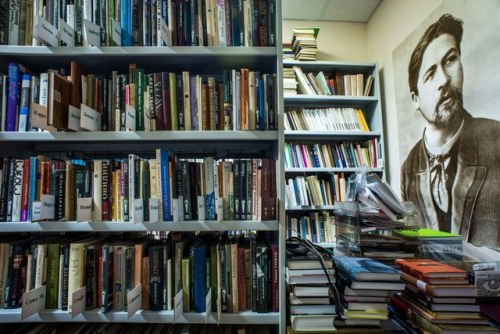
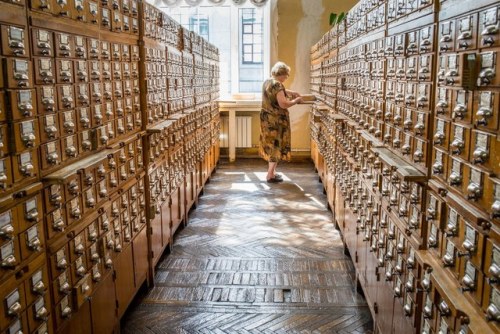
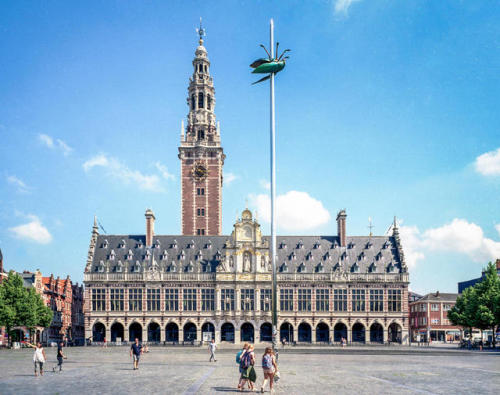



The Spectacular Wonders of Europe’s Libraries
Veteran photographer Robert Dawson earned his bona fides in the 1980s and ’90s shooting spectacular images of the American West, often intended to highlight environmental threats such as drought and overdevelopment. Around the turn of the millennium, though, Dawson refocused on a seemingly unrelated subject: libraries. After exhaustively documenting American libraries, Dawson decided to expand the project worldwide, starting with Europe. He’s spent the past few years criss-crossing the continent from Paris to Moscow, shooting a staggering array of libraries from the ancient to the contemporary, the mundane to the spectacular.
In questa vita imperfetta abbiamo bisogno anche di una certa quantità di cose inutili. Se tutte le cose inutili sparissero, sarebbe la fine anche di questa nostra imperfetta esistenza.
Murakami Haruki, La ragazza dello sputnik
“Io vivo in un'altra dimensione e non ho tempo per le cose che non hanno un'anima.”— Charles Bukowski
“Il fascismo conviene agli italiani perché è nella loro natura e racchiude le loro aspirazioni, esalta i loro odi, rassicura la loro inferiorità.”
Ennio Flaiano, Diario degli errori, 1976 (postumo)
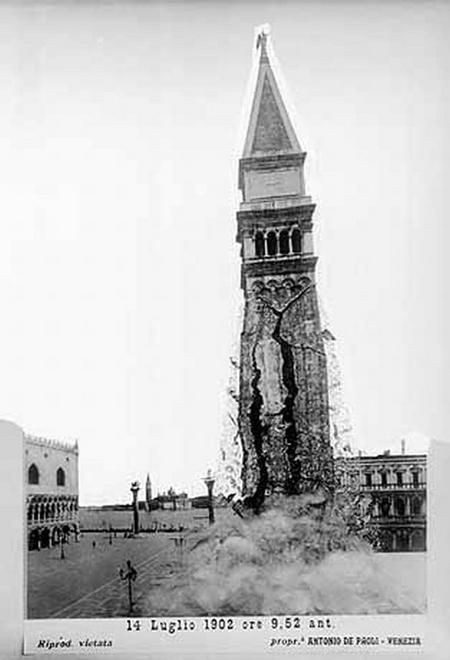
Crollo del campanile di San Marco
La fortuna volle che in quel tragico evento non ci fossero vittime. Ma quando si iniziò a rimuovere le macerie, venne ritrovata una piccola vittima: il gatto del custode!
“Imparerai a tue spese che nel lungo tragitto della vita incontrerai tante maschere e pochi volti.”— -Luigi Pirandello
“The smell of coffee, white dust, tobacco and burnt bread, flowers with a fragrance of wine, and the crimson fruit, soft and overripe. A girl looking over her bare shoulder, with a flash of a smile, gold ear-rings showing from thick black hair brushed away from her face, long arms, a cigarette between her lips. Night like a great dark blanket, voices murmuring at a street corner, the air warm with tired flowers, and a hum from the sea.”— Daphne du Maurier, from “I Will Never Be Young Again,” published c. 1932
“I have lost all power to concentrate on any thought, feeling, or action.”— Virginia Woolf, from a letter to Vanessa Bell written c. July 1910

“There is more treasure in books than in all the pirate’s loot on Treasure Island.” - Walt Disney
“Non ci sono altri giorni che questi nostri giorni. Che mi sia dato di non sprecarli, di non sprecare nulla di ciò che sono e di ciò che potrei essere.”
Italo Calvino
“You have the blood of a poet. You have that and always will. You show, in the middle of savage things (that I like), the gentleness of your heart, that is so full of pain and light.”— Federico García Lorca, from a letter to Miguel Hernández wr. c. April 1933
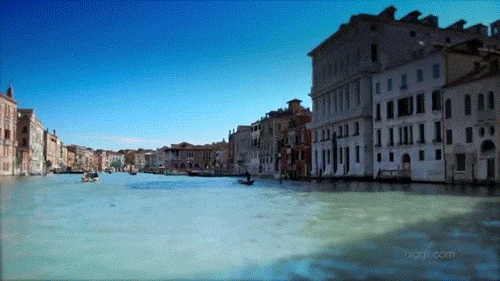
come aggirare i tornelli all’ingresso di Venezia ;)
Il mio peccato principale è il dubbio. Io dubito di tutto e mi trovo sempre nel dubbio.
— Lev Tolstoj
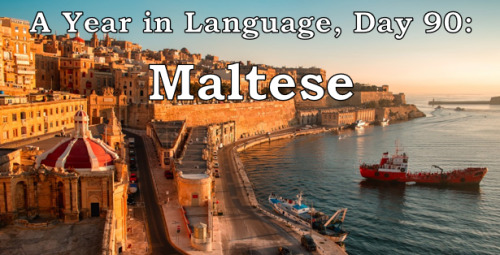
A Year in Language, Day 90: Maltese
Maltese is the national language of Malta, an island republic in the Mediterranean sea just south of Italy. Maltese is a Semitic language, sister to Arabic and Hebrew, the only Semitic language to serve as an official language of the European Union.
Much in the same way the English is a Germanic language that has been marked by an enormous influx of Romantic words and affixes, Maltese is a Semitic language that has undergone the same process, influenced primarily by Italian. The division of root origins between Semitic and Romance is about 50/50. Also like in English, Romance words compromise most of its academic, technical, and generally prestige vocabulary, while most of its more basic vocabulary and grammar words are Semitic.
As most of the grammar is Semitic this means the grammar of Maltese include trilateral roots. In all Semitic languages, morphology (word structure) is based on sets of three consonants, which determine meaning (i.e. “ktb” = “write”) are set with intervening vowels and affixes for precise grammatical meaning (“ktibna” = “we wrote”). Romance roots also take on Semitic affixes, though don’t normally change their vowels. The definite article (English “the”) in Maltese is “Il-”, which is very similar to the Italian equivalent, but is actually from the “al-” of Classic Arabic.
Unlike other Semitic languages Maltese lacks emphatic consonants, though it does have a pharyngeal consonant, written “ħ” both in Maltese orthography and IPA.
Ritorna la primavera.
E la terra è come un bimbo che sa le poesie.
Rainer Maria Rilke
“Ma tu chi sei che avanzando nel buio della notte inciampi nei miei più segreti pensieri?”— William Shakespeare (via ildiariodigin)
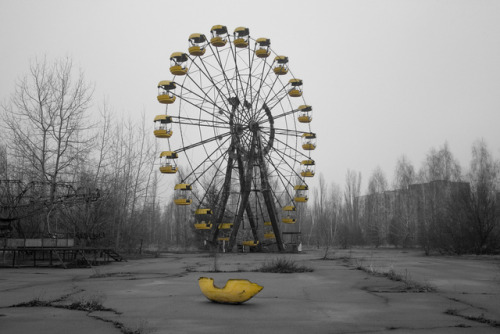




La vita non è in ordine alfabetico come credete voi. Appare… un po’ qua e un po’ là, come meglio crede, sono briciole, il problema è raccoglierle dopo, è un mucchietto di sabbia, e qual è il granello che sostiene l'altro? A volte quello che sta sul cocuzzolo e sembra sorretto da tutto il mucchietto, è proprio lui che tiene insieme tutti gli altri, perché quel mucchietto non ubbidisce alle leggi della fisica, togli il granello che credevi non sorreggesse niente e crolla tutto, la sabbia scivola, si appiattisce e non ti resta altro che farci ghirigori col dito, degli andirivieni, sentieri che non portano da nessuna parte, e dai e dai, stai lì a tracciare andirivieni, ma dove sarà quel benedetto granello che teneva tutto insieme… e poi un giorno il dito si ferma da sé, non ce la fa più a fare ghirigori, sulla sabbia c'è un tracciato strano, un disegno senza logica e senza costrutto, e ti viene un sospetto, che il senso di tutta quella roba lì erano i ghirigori.
Antonio Tabucchi - “Tristano muore”

Books… Books.. Books… There is nothing better than being surrounded by beautiful bookshelves!
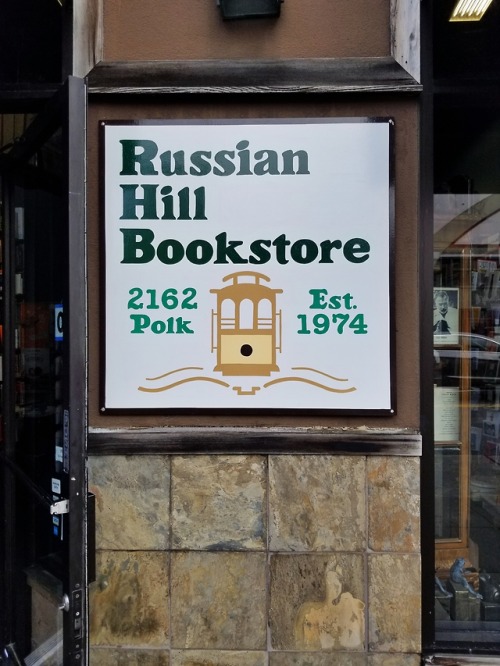
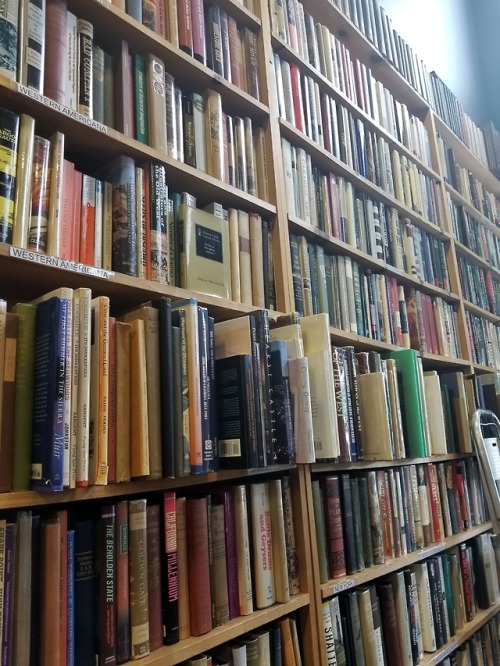
*we managed to hit 3 bookstores this last weekend - and to avoid purchasing anything - which is a serious accomplishment y’all*
A questo mondo, si può fare la guerra, scimmiottare l'amore, torturare i propri simili, pavoneggiarsi sui giornali, o solo dir male del vicino sferruzzando. Ma in certi casi, continuare, nient'altro che continuare, è uno sforzo sovrumano.
Albert Camus
One of the strongest bonds that link us to our favorite stories is the emotional tie, or books that sink a fist right into our guts. When you finished a book where you couldn’t let go of after the last page, chances are, the author successfully punched you in the spleen. If you’ve ever wondered how to do just that, here are some of my favorite methods:
- Make your reader root for your main character(s). Make your character stretch out their arm toward their goal, as far as they can to reach, until their fingertips barely brush it. Make your character want something so much that your reader wants it, too.
- When your character trips and stumbles and stops to question themselves, the readers will hold their breath.
- Push your character to their very limit, and then a little further.
- When your character hits the bottom, they should scrape themselves back together and get back up. Give readers a reason to believe in your character.
- If your character is challenging your plot, your plot should challenge your character.
- Leave a trail of intrigue, of questions, of “what if?” and “what next?”
- If a character loses something (a battle, an important memento, part of themselves), they must eventually gain something in equal exchange, whether for good or bad.
- Raise the stakes. Then raise them higher.
- Don’t feel pressured to kill a character (especially simply to generate emotional appeal). A character death should serve the plot, not the shock factor. Like anything else in your story, only do it if it must be done and there’s no other way around it.
- What’s the worst that can happen? Make it happen. Just make sure that the reader never loses hope.
Nulla è in regalo, tutto è in prestito.
Sono indebitata fino al collo.
Sarò costretta a pagare per me
con me stessa,
a rendere la vita in cambio della vita.
È così che è stabilito,
il cuore va reso
e il fegato va reso
e ogni singolo dito.
È troppo tardi per impugnare il contratto.
Quanto devo
mi sarà tolto con la pelle.
Me ne vado per il mondo
tra una folla di altri debitori.
Su alcuni grava l’obbligo
di pagare le ali.
Altri dovranno, per amore o per forza,
rendere conto delle foglie.
Nella colonna Dare
ogni tessuto che è in noi.
Non un ciglio, non un peduncolo
da conservare per sempre.
L’inventario è preciso,
e a quanto pare
ci toccherà restare con niente.
Non riesco a ricordare
dove, quando e perché
ho permesso che aprissero
questo conto a mio nome.
La protesta contro di esso
la chiamiamo anima.
E questa è l’unica voce
che manca nell’inventario.
Wisława Szymborska
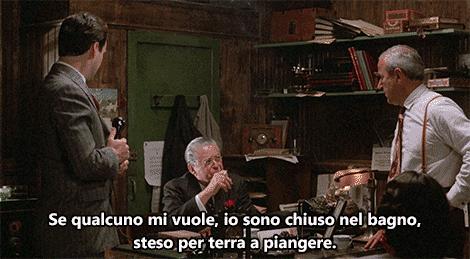
Irving Metzman, “The Purple Rose of Cairo” (Woody Allen, 1985).
Resisti, domani il calendario dice che è giorno festivo!
“Amore e poesia sono misteriosamente legati, perché entrambi sono desiderio di esprimersi, di dire, di comunicare. Non importa con chi.”
Cesare Pavese